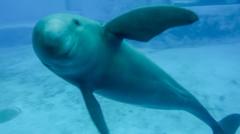As John Hume, a renowned conservationist from South Africa, fights against accusations of smuggling rhino horns valued at $14 million, he proclaims his commitment to legal preservation efforts and declares that he has "nothing to hide."
South Africa’s Rhino Conservationist Denies Smuggling Allegations

South Africa’s Rhino Conservationist Denies Smuggling Allegations
John Hume, once a prominent figure in rhino breeding, faces serious charges yet maintains his innocence amidst controversy.
A prominent conservationist in South Africa, John Hume, has found himself at the center of a legal storm as he faces allegations of smuggling rhino horns worth $14 million (£10 million). Hume, known for founding what is believed to be the largest rhino farm globally, has adamantly denied his involvement in trafficking the horns from South Africa to South East Asia.
The 83-year-old Hume, along with five associates, including a lawyer and a game reserve manager, has been charged with 55 counts that range from theft and money laundering to fraud. Prosecutors allege that Hume's group operated an elaborate scheme between 2017 and 2024, whereby they allegedly smuggled over 960 rhino horns, clandestinely exporting them despite obtaining local permits for legal sales.
While the trade of rhino horns is permissible within South African borders among citizens, any form of exportation remains illegal. The group appeared in a Pretoria magistrate’s court, where they were granted bail, but did not enter any pleas as that is not customary during initial court proceedings in South Africa.
In a public statement, Hume expressed confidence in his innocence, asserting, "I have nothing to hide and have fully cooperated with investigators for years." He categorically rejected all allegations, claiming he has never engaged in illegal activities. "Once the facts are tested in court, I will be vindicated and my innocence confirmed," he stated firmly.
Hume previously owned Platinum Rhino, a farm that once housed around 2,000 southern white rhinos; however, he sold the property in 2023, citing his inability to continue supporting the animals he had dedicated two decades to breeding.
His background is steeped in conservation, having transitioned from developing holiday resorts to focusing on wildlife protection in the 1990s. The outcome of Hume's legal battles is awaited with bated breath as stakeholders in conservation watch closely.




















